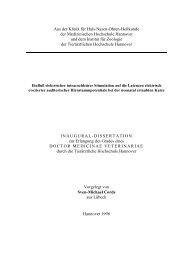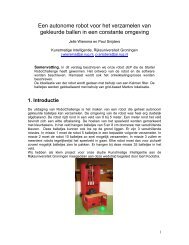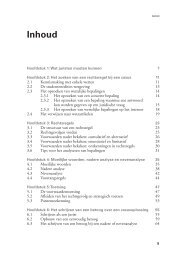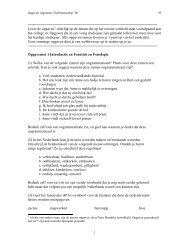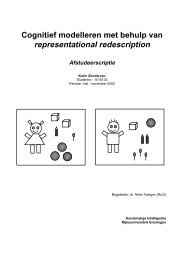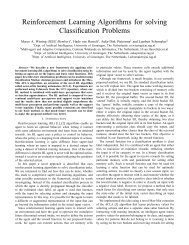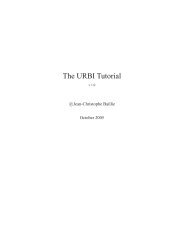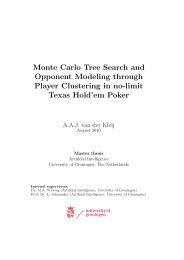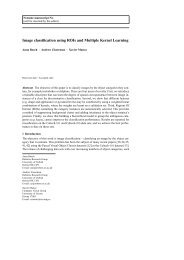Presuppositions in Spoken Discourse
Presuppositions in Spoken Discourse
Presuppositions in Spoken Discourse
You also want an ePaper? Increase the reach of your titles
YUMPU automatically turns print PDFs into web optimized ePapers that Google loves.
Accommodation and Presupposition<br />
presupposition is triggered under an embedd<strong>in</strong>g that creates at least two contexts.<br />
To be able to correctly discuss preferences for higher levels of accommodation<br />
over lower ones, only cases where there was some type of embedd<strong>in</strong>g should be<br />
<strong>in</strong>cluded <strong>in</strong> the count. For this reason I will make a dist<strong>in</strong>ction between global<br />
accommodation (GLOBAL) for cases where the presupposition is triggered <strong>in</strong> at least<br />
one level of embedd<strong>in</strong>g, and ma<strong>in</strong> accommodation (MAIN), where there is no<br />
embedded context and the only level possible for accommodation is <strong>in</strong> the ma<strong>in</strong><br />
DRS, i.e. where the home DRS of the trigger is the ma<strong>in</strong> DRS of the discourse.<br />
This means that accommodation at each level was tested to determ<strong>in</strong>e if the<br />
resolution would result <strong>in</strong> a well-formed DRS, e.g. with no unbound variables, as<br />
well as a DRS acceptable from a discourse perspective, i.e. both consistent and<br />
<strong>in</strong>formative. Currently, cases of INTERMEDIATE accommodation are counted with<br />
LOCAL because it was often unclear what the differences <strong>in</strong> read<strong>in</strong>gs will be<br />
between <strong>in</strong>termediate and local accommodation.<br />
Table 5 presents the number of examples of each type found <strong>in</strong> the London-<br />
Lund corpus.<br />
Ma<strong>in</strong> DRS (MAIN) and global accommodation (GLOBAL) were the most<br />
frequent analysis for presuppositions triggered by all trigger types except for too.<br />
The low number of examples of GLOBAL and LOCAL accommodation may be<br />
the result of a lower frequency of embedded contexts <strong>in</strong> dialogue. For abstract<br />
triggers, there were only 28 cases where the trigger<strong>in</strong>g expression occurred under at<br />
least one identifiable level of embedd<strong>in</strong>g. For def<strong>in</strong>ite NPs categorized as new there<br />
were no presuppositional expressions accommodated under embedd<strong>in</strong>g. A possible<br />
explanation for this could be that present<strong>in</strong>g <strong>in</strong>formation or ideas us<strong>in</strong>g these types<br />
of contexts may be less frequent than concrete references to the past or to the here<br />
and now <strong>in</strong> <strong>in</strong>formal conversation.<br />
The tendency to accommodate differed greatly by trigger type. Aspectual<br />
verbs, followed by factives, were the most likely to accommodate. On the other<br />
hand, only two presuppositions triggered by too could be <strong>in</strong>terpreted as possible<br />
cases of accommodation. One of these cases was an utterance with too found at the<br />
beg<strong>in</strong>n<strong>in</strong>g of a record<strong>in</strong>g where the speakers were already engaged <strong>in</strong> their<br />
conversation when they entered the room with the recorder. This might mean that<br />
this particular presupposition was not <strong>in</strong>tended to be accommodated and had an<br />
antecedent <strong>in</strong> the part of the conversation that was not recorded.<br />
101



